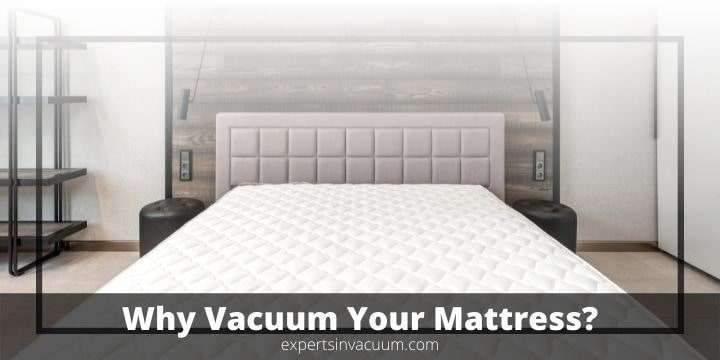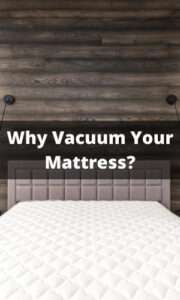A person spends roughly one-third of their time sleeping on their mattress, but it gets little attention when it comes to cleaning.
Few people consider cleaning their mattress because freshly laundered sheets and bedding create the impression that the entire bed is clean and fresh.

However, the opposite is true, because there is a lot going on under your bedding that you may be unaware of. Your mattress is a haven for a lot of unsavory things, including skin cell buildup and dust that settles on it from the air.
That means that you may be breathing in and laying on gross particles every time you go to sleep on your bed. This article provides you with insight on why you should vacuum your mattress and how to vacuum it.
In this post we will cover:
- Why Should You Vacuum Your Mattress?
- How Should You Vacuum & Clean Your Mattress?
- How Often Should You Vacuum Your Mattress?
- What are the best mattress vacuuming practices?
- The benefits of vacuuming your mattress?
- Can you clean your mattress without a vacuum cleaner?
Why Should You Vacuum Your Mattress?
A mattress is used on a daily basis since you sleep on it. Humans shed a lot of skin per day, which is enough to feed many dust mites.
Dust mites are significant contributors to allergy issues. Aside from dust mites, there are other synthetic and biological things that lurk beneath your mattress.
These include the following:
Allergens: these include things such as pet dander, dust mites, particles, and dead skin. The allergens, alongside byproducts of some insects and roaches, may aggravate the symptoms of allergy and asthma sufferers.
Cosmetics: there are many harmful particles in the makeup that you use if you do apply makeup and also lotion that can be absorbed in your mattress when you go to bed while you have them on your body.
Fungal spores: there are types of mold and fungi such as Penicillium, Alternaria, and Cladosporium which have been shown to create health issues such as respiratory infections and bronchitis.
Food: decaying food that you took to your bed while snacking will attract insects and even promote the growth of bacteria.
Sweat: when you sweat your mattress will absorb that perspiration which will attract things such as fungi, mold, and mildew as the condition will promote bacterial growth.
Bacteria: harmful bacteria is created by bodily fluids, skin cells, and fecal matter.
When you allow these things to grow and thrive on your mattress even your sleep with be affected with all these things beneath your bedding.
The chemicals, bacterial, and fungi may result in health issues whose symptoms are not obvious.
Therefore, you should vacuum your mattress as often as possible to eliminate the biological and synthetic matters that may pose a health risk to you or aggravate the health conditions that already affect you.
How Should You Vacuum & Clean Your Mattress?
Begin with a clean sweep: remove the sheets, pillowcases, and pillows and give them a good clean alongside your mattress.
After removing the sheets and pillows, the mattress remains bare, allowing you to thoroughly vacuum it and get rid of any skin flakes, bugs, and feces.
Ensure that you get into the seams of the mattress, divots, and around labels since these are the areas where most detritus accumulates.
If you have a full sized vacuum cleaner, make use of the upholstery attachment or use a handheld vacuum for mattresses for a more serious clean.
Vacuums for mattresses possess more suction power and are able to pull out more dirt from your mattress.
Vacuum gently: gently remove all allergens to remove as many allergens as possible, including mites, and skin cells.
In the handheld mode, use a mini motorized tool because it has stiff nylon bristles capable of agitating fibers in your mattress and loosening dust mites and debris.
The tool will not damage the surface of your mattress. Just ensure that your vacuum has a complete seal system of filtration to prevent the allergens from being expelled back into the air as you clean.
Focus on areas that are difficult to reach: once you are done with the surface, focus on folds and crevices where allergens and dust gather. Use a crevice tool to clean around your mattress’s edges to eliminate dust as well as under your bed.
Turn the mattress over: to reduce the concentration of invisible allergens, flip your mattress over and vacuum the other side as well.
Get fresh: after sucking up the gross particles with your vacuum, work on sweat and other stains on the mattress. Lightly spray your mattress surface with a tablespoon of liquid dish soap and a cup of warm water.
If the mattress has pet urine stains, use a pet stain enzyme cleaner and a handheld attachment on a steam cleaner to remove the pet urine stain.
After that, use a cup of warm water and three drops of peppermint essential oil to remove lingering smells by spraying them on the mattress and leaving them to dry.
When you are finished with the stain removal, sprinkle some baking soda on the mattress and leave it there for an hour or until the mattress dries. After that, use your vacuum to go over the mattress to remove the baking soda.
How Often Should You Vacuum Your Mattress?
A mattress is used on a daily basis, and therefore its cleaning frequency is essential. Generally, a mattress should be vacuumed every three to six months.
However, the cleaning frequency also depends on other circumstances which affect different households differently.
The frequency with which you should vacuum your mattress also depends on your susceptibility to allergens and the type of your mattress.
For instance, if you or someone in your home suffers from allergies, vacuuming will need to be more frequent to eliminate dust and other allergens.
That should happen once a month and at the very least, vacuuming your mattress should be part of your seasonal cleaning.
When you clean up spills or spots after vacuuming, ensure that you give your mattress ample time to dry before putting your bedding on. Aside from vacuuming, disinfect your mattress as part of your cleaning routine.
Spray the disinfectant lightly across the surface of the mattress to prevent it from getting wet since moisture will attract mildew or mold. After that, wipe with a clean cloth that has been dipped in warm water and has been thoroughly rinsed out.
Conclusion
A mattress is usually covered and looks spotless, and this often misleads people into thinking that it is clean. However, the mattress is usually covered with dirt, bacteria, dead skin flakes, and other millions of microorganisms due to daily usage.
Therefore, you have to vacuum your mattress regularly to get rid of all the filth and murk that lives in it. Cleaning the mattress is not something that is done every day, but rather once a month or every three to six months.
However, if you have more time, you can vacuum more often.
Regular cleaning will prevent allergy triggers by allergens in your mattress and also other health problems caused by them. Just changing the bed sheets and cleaning the pillows is not enough if the mattress is left unattended.
FAQs
What are the best mattress vacuuming practices?
Eliminating and controlling dust mites, clearing out pollutants, and preventing fungi build-up requires you to have a schedule for regularly vacuuming your mattress. However, there are some best practices to follow and they include:
1. Making sure that the hose and the vacuuming route are clear of obstructions and have been connected securely for maximum suction. That will help you to remove dirt and as many pollutants as possible.
2. Vacuum the whole surface of your mattress using your vacuum’s upholstery attachment. For crevices and seams, switch to the crevice attachment to remove the dirt that collects in these areas.
3. While vacuuming your mattress, also remember to vacuum the bed frame, nearby upholstered furniture, the carpeting around the bed, and the baseboard. Also, thoroughly vacuum under your bed.
4. Once you are done vacuuming spot treat any stained areas on your mattress with the appropriate cleaner. Keep your mattress clean after vacuuming by using a mattress cover.
What are the benefits of vacuuming your mattress?
The benefits of vacuuming your mattress include keeping a healthy indoor air quality in your bedroom. A person spends an average of eight hours sleeping and therefore, having good air quality in the bedroom is essential.
Poor air quality in the room may cause ailments such as throat and eye irritation and serious respiratory illnesses. You may also experience common symptoms like watery eyes, sneezing, and fatigue.
Secondly, when you minimize contact with allergens, you will have fewer allergy triggers since allergy sufferers experience the worst attacks at night when they are sleeping because their bodies react to the dust and mites from the mattress.
Thirdly, sleeping on a clean mattress will give you peace of mind and good sleep quality, which is important. Good sleep improves emotional wellness and physical health.
Can you clean your mattress without a vacuum cleaner?
Yes, you can still be able to clean your mattress without a vacuum cleaner. Cleaning your bedding will protect your mattress, and that means that you have to wash your pillowcases, sheets, throws, and comforters every week.
Whenever your bed is stained, it is advisable to remove all your bedding and wash them, including your mattress cover. Most stains are easily removed with a homemade cleaning solution.
Mix water and mild dish soap until suds form. Then apply the suds to the soiled area using a cloth that has been wrung out. Do not get the interior of your mattress padding too damp.
Some stains need a gentle scrub to break them down, while tougher ones need extra cleaning power.
Mix a cup of 3% hydrogen peroxide with a few drops of dishwashing liquid and 3 tablespoons of baking soda. Mist the stain and then use an old toothbrush or a soft scrub brush to gently brush it until the stain is removed.
Mist the cleaned area with fresh water and use an absorbent towel to blot it out to finish the cleaning. Let the mattress dry outside or use a fan to blow across the mattress to decrease the drying time.

Recommended Post